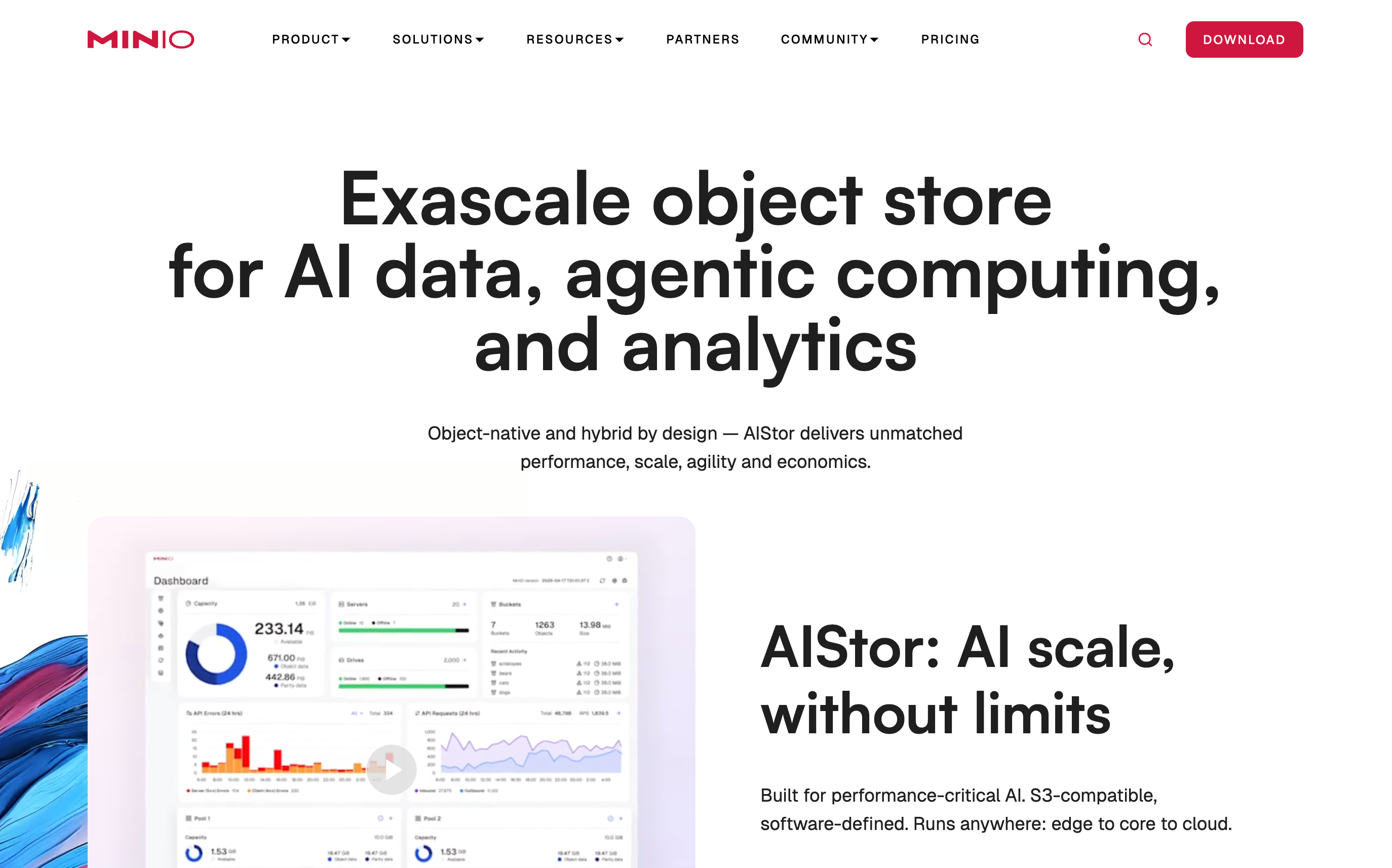Self-Host MinIO - High-Performance S3-Compatible Object Storage

MinIO is a high-performance, S3-compatible object storage server designed for cloud-native applications and enterprise workloads. As the world's fastest object storage server, MinIO provides the perfect foundation for data lakes, backup storage, and cloud-native applications with enterprise-grade security and performance.
Why Choose Self-Hosted MinIO?
⚡ Unmatched Performance
- 55 GB/s read and 35 GB/s write on standard hardware
- Ultra-low latency for time-sensitive applications
- Horizontal scaling to exabytes of storage
- Optimized for NVMe and SSD storage
🔒 Enterprise Security
- End-to-end encryption with customer-managed keys
- IAM and policy-based access control
- Active Directory/LDAP integration
- Immutable storage for compliance requirements
💰 Cost-Effective Storage
- No licensing fees - completely open source
- Efficient erasure coding reduces storage overhead
- Lifecycle management for automated data tiering
- Hardware flexibility - run on any x86 server
Key Features
- S3 API Compatibility: Drop-in replacement for Amazon S3
- Multi-Cloud Gateway: Unified interface across cloud providers
- Distributed Architecture: Scale across multiple nodes and locations
- Data Protection: Erasure coding and bit-rot protection
- Event Notifications: Real-time events via webhooks, Kafka, MQTT
- Encryption: AES-256-GCM server-side encryption
- Versioning: Object versioning and lifecycle management
- Web Console: Modern management interface
Popular Use Cases
🗄️ Data Lake & Analytics
- Store petabytes of structured and unstructured data
- Integrate with Spark, Hadoop, and analytics frameworks
- Build modern data architectures with object storage
- Support for Parquet, Delta Lake, and Apache Iceberg
💾 Backup & Archive
- Enterprise backup and disaster recovery
- Long-term data archival and compliance
- Database backup storage (MySQL, PostgreSQL, MongoDB)
- VM and container image storage
🚀 Cloud-Native Applications
- Kubernetes-native storage for stateful applications
- Container image registry backend
- Static website hosting and CDN origin
- Microservices data persistence layer
Deployment Options
Docker Compose Setup
version: '3.8'
services:
minio:
image: minio/minio:latest
container_name: minio
ports:
- "9000:9000"
- "9001:9001"
volumes:
- minio-data:/data
environment:
MINIO_ROOT_USER: minioadmin
MINIO_ROOT_PASSWORD: minioadmin123
MINIO_CONSOLE_ADDRESS: ":9001"
command: server /data --console-address ":9001"
healthcheck:
test: ["CMD", "curl", "-f", "http://localhost:9000/minio/health/live"]
interval: 30s
timeout: 20s
retries: 3
volumes:
minio-data:
Distributed Cluster Setup
# 4-node distributed cluster
minio server http://node{1...4}/data{1...4} \
--console-address ":9001"
Getting Started
- Deploy MinIO using Docker, Kubernetes, or bare metal
- Access the console at
http://localhost:9001 - Create buckets for organizing your data
- Configure access policies and users
- Integrate applications using S3 SDKs
- Set up monitoring and alerts
Client Integration
Python (boto3)
import boto3
from botocore.client import Config
# Configure MinIO client
s3 = boto3.client('s3',
endpoint_url='http://localhost:9000',
aws_access_key_id='minioadmin',
aws_secret_access_key='minioadmin123',
config=Config(signature_version='s3v4')
)
# Upload file
s3.upload_file('/path/to/file.txt', 'mybucket', 'file.txt')
JavaScript/Node.js
const AWS = require('aws-sdk');
// Configure MinIO client
const s3 = new AWS.S3({
endpoint: 'http://localhost:9000',
accessKeyId: 'minioadmin',
secretAccessKey: 'minioadmin123',
s3ForcePathStyle: true,
signatureVersion: 'v4'
});
// Create bucket
s3.createBucket({Bucket: 'mybucket'}, (err, data) => {
console.log(err || data);
});
Advanced Configuration
🔐 Security & Access Control
# Create service account
mc admin user add myminio newuser newuser123
# Create policy
mc admin policy add myminio readwrite policy.json
# Assign policy to user
mc admin policy set myminio readwrite user=newuser
📊 Monitoring & Metrics
- Prometheus metrics endpoint
- Grafana dashboards for visualization
- Health check endpoints
- Audit logging capabilities
🔄 Backup & Replication
- Cross-site replication for disaster recovery
- Bucket-level replication rules
- Integration with backup tools (Velero, Kasten)
- Point-in-time recovery capabilities
Performance Optimization
- Hardware: Use NVMe SSDs for best performance
- Network: 10GbE or higher for distributed setups
- CPU: Modern multi-core processors recommended
- Memory: 32GB+ RAM for large deployments
- Erasure Coding: Configure for optimal redundancy/performance balance
MinIO vs Cloud Storage
| Feature | MinIO | Amazon S3 | Google Cloud | Azure Blob |
|---|---|---|---|---|
| Cost Control | ⭐⭐⭐⭐⭐ | ⭐⭐ | ⭐⭐ | ⭐⭐ |
| Data Sovereignty | ✅ | ❌ | ❌ | ❌ |
| Performance | ⭐⭐⭐⭐⭐ | ⭐⭐⭐⭐ | ⭐⭐⭐⭐ | ⭐⭐⭐⭐ |
| S3 Compatibility | ⭐⭐⭐⭐⭐ | ⭐⭐⭐⭐⭐ | ⭐⭐⭐ | ⭐⭐⭐ |
| Vendor Lock-in | None | High | High | High |
| Egress Costs | None | High | High | High |
Enterprise Features
High Availability: Multi-node clusters with automatic failover
Compliance: FIPS 140-2, Common Criteria certifications
Encryption: Customer-managed keys (CMK) and KMS integration
Identity: Active Directory, LDAP, OpenID Connect integration
Governance: Legal hold, retention policies, and audit trails
Integration Ecosystem
Container Orchestration: Kubernetes Operator, Docker Swarm
Big Data: Apache Spark, Hadoop, Presto, Trino
Databases: PostgreSQL, MySQL backup integration
CI/CD: GitLab, Jenkins artifact storage
Monitoring: Prometheus, Grafana, ELK Stack
Transform your storage infrastructure with MinIO's enterprise-grade object storage that scales from terabytes to exabytes while maintaining complete control over your data!